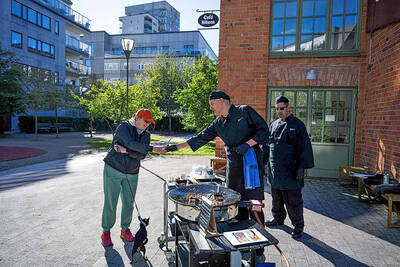Vietnam’s sometimes edgy relationship with religious freedom is being tested in a dispute over a monastery inhabited by disciples of Thich Nhat Hanh, one of the world’s most famous Zen masters.
For four years, the Buddhist monks and nuns at Bat Nha monastery in central Vietnam have been quietly meditating and studying the teachings of the 82-year-old Vietnamese sage who is perhaps the world’s best-known living Buddhist after Tibet’s Dalai Lama.
Lately, however, they are in a standoff that could test the patience of even the most enlightened.
First, local authorities cut off their power, water and telephones.
Then, a mob descended on their compound with sledgehammers, smashing windows, damaging buildings and threatening occupants.
Communist authorities have ordered the 379 Vietnamese monks to leave the monastery in Vietnam’s Central Highlands. They say the standoff stems from disagreements between two Buddhist factions at the monastery.
Hanh’s followers, however, believe they are being punished because of Hanh’s praise for the Dalai Lama and his call to broaden religious freedom in Vietnam.
The affair represents a remarkable turnaround from four years ago, when France-based Hanh returned to his native land after 39 years of exile during which he developed a philosophy called “Engaged Buddhism” and sold more than 1 million books in the West.
In 1966, he had been forced out of what was then US-backed South Vietnam for criticizing the Vietnam War. His return in 2005 made the front pages of state-owned newspapers and he met with the prime minister. The abbot at Bat Nha, which belonged to the official Buddhist Church of Vietnam, invited Hanh’s followers to train monks in their brand of Buddhism at the temple there.
Many saw all this as evidence that the Communist government was easing restrictions on religious freedom. Hanh’s supporters spent US$1 million to buy land for new buildings and a meditation hall that holds up to 1,800 people.
But the harmony began to unravel last year, Hanh’s followers said.
Chinese officials were upset about published comments he made in support of the Dalai Lama and pressured Vietnam to bar the Zen master from addressing an international Buddhist gathering in Hanoi, they said.
In an interview with Italian TV, Hanh had said that Vietnam should allow the Dalai Lama to attend the Hanoi gathering and China should allow the Dalai Lama to return to Tibet to meet with his followers there, just as Hanh was allowed to return to Vietnam.
“I’m sure he knew that speaking out would bring him problems,” said Sister Dang Nghiem, a close Hanh associate who spent six months at Bat Nha.
And soon enough, problems began. On Oct. 29 last year the chairman of Vietnam’s national Committee on Religious Affairs wrote a letter accusing Plum Village, Hanh’s monastery in southern France, of publishing false information about Vietnam on its Web site.
Without mentioning specifics, the letter said the information distorted Vietnam’s policies on religion and could undermine national unity.
The letter also said that Hanh’s followers should leave Bat Nha and stressed that Abbot Duc Nghi, the property’s original owner, wanted them to go. Nghi could not be reached and committee members declined to comment, saying they needed several days to arrange an interview.
Sister Dang said the Plum Village followers were taken by surprise when Nghi told them to leave because the abbot had visited the monastery in France two or three times and seemed to respect Hanh.
She theorized that Nghi must have been pressured from above to ask the Plum Village practitioners to leave. Otherwise, she said, any tensions between the two camps could have been resolved.
However, Hanh’s supporters said some of Nghi’s followers and other local residents have harassed them intermittently over the last year.
On June 27 the power was cut. Then the compound was raided, and two days later a mob threw rocks and animal excrement at a delegation from the local branch of Vietnam’s official Buddhist church that came to investigate, members of the group said.
Local authorities said it was the abbot who asked for the electricity to be cut and that it was restored two weeks ago. But Phap Hoi, a monk at Bat Nha, said in a telephone interview this week that the power was still out.

READINESS: According to a survey of 2,000 people, 86 percent of Swedes believe the country is worth defending in the event of a military attack Swedes are stocking up on food items in case of war, as more conflict in Europe no longer feels like a distant possibility, and authorities encourage measures to boost readiness. At a civil preparedness fair in southwest Stockholm, 71-year-old Sirkka Petrykowska said that she is taking the prospect of hostilities seriously and preparing as much as she can. “I have bought a camping stove. I have taken a course on preservation in an old-fashioned way, where you can preserve vegetables, meat and fruit that lasts for 30 years without a refrigerator,” Petrykowska said. “I’ve set aside blankets for warmth, I

FRUSTRATIONS: One in seven youths in China and Indonesia are unemployed, and many in the region are stuck in low-productivity jobs, the World Bank said Young people across Asia are struggling to find good jobs, with many stuck in low-productivity work that the World Bank said could strain social stability as frustrations fuel a global wave of youth-led protests. The bank highlighted a persistent gap between younger and more experienced workers across several Asian economies in a regional economic update released yesterday, noting that one in seven young people in China and Indonesia are unemployed. The share of people now vulnerable to falling into poverty is now larger than the middle class in most countries, it said. “The employment rate is generally high, but the young struggle to

ENERGY SHIFT: A report by Ember suggests it is possible for the world to wean off polluting sources of power, such as coal and gas, even as demand for electricity surges Worldwide solar and wind power generation has outpaced electricity demand this year, and for the first time on record, renewable energies combined generated more power than coal, a new analysis said. Global solar generation grew by a record 31 percent in the first half of the year, while wind generation grew 7.7 percent, according to the report by the energy think tank Ember, which was released after midnight yesterday. Solar and wind generation combined grew by more than 400 terawatt hours, which was more than the increase in overall global demand during the same period, it said. The findings suggest it is

‘ARMED CONFLICT’: At least 21 people have died in such US attacks, while experts say the summary killings are illegal even if they target confirmed narcotics traffickers US forces on Friday carried out a strike on an alleged drug-smuggling boat off the coast of Venezuela, killing four people, US Secretary of Defense Pete Hegseth said. The latest strike, which Hegseth announced in a post on X, brings the number of such US attacks to at least four, leaving at least 21 people dead. An accompanying video shared by Hegseth showed a boat speeding across the waves before being engulfed in smoke and flames. “Four male narco-terrorists aboard the vessel were killed,” the Pentagon chief wrote. He said the strike “was conducted in international waters just off the